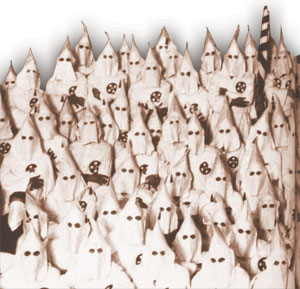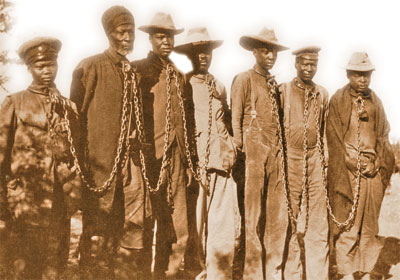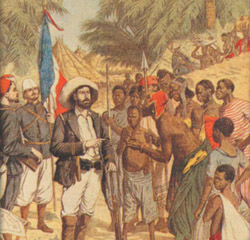Though racism can be found throughout history, Darwin was the first to give it an alleged scientific validity. The subtitle of The Origin of Species was The Preservation of Favoured Races in the Struggle for Life. Darwin's writings about “the preservation of favored races,” and in particular the unscientific claims in his The Descent of Man, lent support to the Nazis' erroneous belief in the superiority of Aryan race, and a similar British belief about the Anglo-Saxons. In addition, Darwin's theory of natural selection spoke of a fight to the death, a “law of the jungle.” Applying it to human societies made conflict and war inevitable between races and nations. A great many prominent figures of the time, from warlike statesmen to philosophers, from politicians to scientists, adopted Darwin's theory. In The Twisted Road to Auschwitz, Professor Karl A. Schleunes of North Carolina University's history faculty describes how:
 |
| A black slave who was tortured and flogged |
Darwin's notion of struggle for survival was quickly appropriated by the racists... such struggle, legitimized by the latest [so-called] scientific views, justified the racists' conception of superior and inferior peoples... and validated the struggle between them.37
With the claims put forward by Darwin, those who held racist views naturally imagined that they had found a scientific foundation for their views about human classes. But shortly afterwards, science revealed that in the same way that Darwin's claims had no scientific validity, a great many movements built around Darwin's ignorant views had committed an enormous error.
With the support it received from Darwinism, the Nazis practiced racism in the most violent manner. Yet Germany was not the only place where so-called “scientific” racism reared its head. A number of racist administrators and intellectuals arose in many countries, particularly in Great Britain and America, racist laws and practices also made a rapid appearance.
Evolutionists in the 19th and early 20th centuries held almost totally racist views. Many scientists had no hesitation about openly expressing such opinions. Books and articles written at the time offer the most concrete proof. In Outcasts from Evolution: Scientific Attitudes of Racial Inferiority, John S. Haller, a professor of history at Southern Illinois University, describes how all 19th-century evolutionists falsely believed in the superiority of the white race and that other races were inferior. One article in American Scientist magazine calls Haller's book:
... extremely important... documenting as it does what has long been suspected: the ingrained, firm, and almost unanimous racism of North American men of science during the 19th (and into the 20th) century... Ab initio, Afro-Americans were viewed by these intellectuals as being in certain ways unredeemably, unchangeably, irrevocably inferior.38
Another article in Science magazine made the following comment about some of Haller's claims:
What was new in the Victorian period was Darwinism... Before 1859, many scientists had questioned whether blacks were of the same species as whites. After 1859, the evolutionary schema raised additional questions, particularly whether or not Afro-Americans could survive competition with their white near-relations. The momentous answer was a resounding no. … The African was inferior because he represented the “missing link” between ape and Teuton.39
Of course, this claim is totally unfounded. That people have different skin colors or different racial or ethnic origins doesn't make them superior or inferior to anyone else. One main reason why this deception became prevalent in the 19th century was the widespread ignorance of the time, itself due to the primitive scientific conditions.
Another example of a scientist known for his racist views was Princeton University's American biologist Edwin G. Conklin who, like other racists, had no qualms about openly expressing his perverted opinions:
Comparison of any modern race with the Neanderthal or Heidelberg types show that... Negroid races more closely resemble the original stock than the white or yellow races. Every consideration should lead those who believe in the superiority of the white race to strive to preserve its purity and to establish and maintain the segregation of the races.40
William Sollas, a professor of paleontology and geology from Oxford University, set out his views in his 1911 book Ancient Hunters:
Justice belongs to the strong, and has been meted out to each race according to its strength ... It is not priority of occupation, but the power to utilize, which establishes a claim to the land. Hence it is a duty which every race owes to itself, and to the human family as well, to cultivate by every possible means its own strength: directly it falls behind in regard it pays to this duty, whether in art of science, in breeding or in organisation for self-defence, it occurs a penalty which Natural Selection, the stern but beneficent tyrant of the organic world, will assuredly exact, and that speedily, to the full.41
To say that justice belongs to the strong—a grave error—will lead to terrible social chaos. No matter what the conditions and circumstances, all people must benefit from true justice, regardless of their color, language or gender. The claim made by Darwinist racists that justice only applies to the strong in no way reflects the truth. Every individual may wish to acquire things of the highest quality and the most attractive for himself and for his society, but he is never justified in ignoring the harm he inflicts on others in doing so. To claim the opposite violates reason and good conscience.
 |
| The middle of the 20th century saw another surge of racism in certain regions of the USA. The Ku Klux Klan, whose ideology was based on violence, was one of the most prominent supporters of American racism. This organization supported such errors as the superiority of the white race and caused the deaths of a great many people. |
One can encounter racist views in subsequent years also, even in the writings of evolutionists who claim not to be racist—as a natural consequence of their belief in evolution. One of these is paleontologist George Gaylord Simpson who, no matter how strongly he resents being termed a racist, claimed in an article published in Science magazine that racial differences appeared as a result of evolution, and that some races are more advanced or backward than others:
Evolution does not necessarily proceed at the same rate in different populations, so that among many groups of animals it is possible to find some species that have evolved more slowly, hence are now more primitive, as regards some particular trait or even overall. It is natural to ask—as many have asked—whether among human races there may not similarly be some that are more primitive in one way or another or in general. It is indeed possible to find single characteristics that are probably more advanced or more primitive in one race than in another.42
Despite its having no scientific basis whatsoever, Simpson's superstitious view was adopted by certain circles for ideological reasons. In defending the theory of evolution's unscientific claims in their writings, books, and speeches, other scientists of the time also supported racism. An article titled “The Evolution of Human Races,” by Henry Fairfield Osborn, president of the American Museum of Natural History and a prominent racist and evolutionist anthropologist of the early 20th century, made comparisons between races and came up with a number of deductions totally lacking any scientific evidence:
The standard of intelligence of the average adult Negro is similar to that of the eleven-year-old youth of the species Homo sapiens.43
As can be seen from such statements, most 19th- and 20th-century evolutionist scientists were racists who ignored the dangers posed by their twisted views. About the destructive effects of their so-called “scientific” racism, the American scientist James Ferguson has this to say:
In 19th-century Europe the concept of race was a preoccupation for the growing human sciences... These first physical anthropologists helped to develop the concept of Aryan supremacy, which later fueled the institutional racism of Germany in the 1930s, and of South Africa today.44
In an article about the racist views of evolutionist anthropologists, the late evolutionist Stephen Jay Gould says the following:
We cannot understand much of the history of late 19th and early 20th century anthropology… unless we appreciate its obsession with the identification and ranking of races.45
Once the theory of evolution acquired an alleged scientific validity, scientists were able to speak without hesitation of such illusory concepts as “inferior” races and some races being more closely related to apes than to human beings. Despotic dictators such as Hitler recognized such claims as a golden opportunity and killed millions of people because they were “inferior,” “inadequate,” “flawed” or “sick.” One of the main reasons why almost all 19th century evolutionists were racists is that their intellectual forerunner, Darwin, himself held such views.
 |
| The native Australians or Aborigines, whom Darwinists regarded as inferior, are no different from any other race. The photo on the right shows the native Australian athlete Cathy Freeman lighting the 2000 Olympic flame. |
The great majority of present-day evolutionists say that unlike their 19th century counterparts, they are opposed to racism, and seek to free Darwin of racist imputations. Most writings about Darwin make great efforts to give the impression that he was compassionate, well intentioned, and opposed to slavery. The fact is, however, that Darwin believed that the theory of natural selection constituted a scientific justification for racial discrimination and conflict between races. Darwin's books, some of his letters, and his private notes contain openly racist expressions. For example, in The Descent of Man, Darwin claimed that certain races, such as blacks and Aborigines, were inferior and that in due course, they would be eliminated and disappear in the struggle for survival:
At some future period not very distant as measured by centuries, the civilised races of man will almost certainly exterminate, and replace the savage races throughout the world. At the same time the anthropomorphous apes… will no doubt be exterminated. The break between man and his nearest allies will then be wider, for it will intervene between man in a more civilised state, as we may hope, even than the Caucasian, and some ape as low as the baboon, instead of as now between the negro or Australian and the gorilla.46
In those words Darwin equated certain races with primates and predicted that “civilized races of man” would eliminate “savage races” from the face of the Earth. In other words, Darwin was foreseeing genocide, a racial ethnic cleansing to take place in the near future. Indeed, Darwin's disastrous “predictions” actually did come about, and 20th-century racists saw the theory of evolution as offering them support to perpetrate terrible slaughter. Examples include the Nazis' murder of some 40 million people during the World War II, the South African government's apartheid system affording European races immense privileges over others, racist attacks against Turks and other foreigners in Europe, racial discrimination against blacks in the USA and against the native Aborigines in Australia, and the neo-Nazi movement that from time to time raises its head in various European countries. All gained strength from the alleged scientific support provided by Darwinism. (For further details on the connection between fascism, racism and Darwinism, see Harun Yahya's Fascism: The Bloody Ideology of Darwinism, Kultur Publishing, April 2002.)
 |
| Darwin's book The Voyage of the Beagle |
Nor were Darwin's racist statements limited to these. For example, in The Voyage of the Beagle, published before The Origin of Species, he speaks of encountering “backward” human races from Tierra del Fuego:
It was without exception the most curious & interesting spectacle I ever beheld. I would not have believed how entire the difference between savage & civilised man is. It is much greater than between a wild & domesticated animal... [I] believe if the world was searched, no lower grade of man could be found.47
This is how Darwin describes the native people of Patagonia, whom he calls “barbarian”:
Perhaps nothing is more certain to create astonishment than the first sight in his native haunt of a barbarian—of man in his lowest and most savage state. One's mind hurries back over past centuries, and then asks, could our progenitors have been men like these?—men, whose very signs and expressions are less intelligible to us than those of the domesticated animals... I do not believe it is possible to describe or paint the difference between savage and civilised man.48
In a letter to Charles Kingsley, Darwin described the Fuegian natives he saw:
I declare the thought, when I first saw in Tierra del Feugo a naked, painted, shivering, hideous savage, that my ancestors must have been somewhat similar beings, was at that time as revolting to me, nay more revolting, than my present belief that an incomparably more remote ancestor was a hairy beast. Monkeys have downright good hearts.49
All these are important indications of Darwin's racism. Disparaging certain races as much as he can, he humanizes and praises apes by referring to them as good-hearted animals. He openly maintained that “inferior” races needed to be eliminated, that this consequence of natural selection would make a major contribution to the advance of civilization, as in a letter to the scientist W. Graham in July 1881:
I could show fight on natural selection having done and doing more for the progress of civilization than you seem inclined to admit. Remember what risk the nations of Europe ran, not so many centuries ago of being overwhelmed by the Turks, and how ridiculous such an idea now is! The more civilised so-called Caucasian races have beaten the Turkish hollow in the struggle for existence. Looking to the world at no very distant date, what an endless number of the lower races will have been eliminated by the higher civilized races throughout the world.50
 |
| Slaves seeking their freedom in Western South Africa in 1904were savagely put down. |
Darwin's racist nonsense extended even as far as the highly moral and glorious Turkish nation. (For more about Darwin's baseless and hostile statements regarding the Turkish nation, and how they are historically and scientifically unfounded, see Harun Yahya's Evrim Teorisinin Irkçı Yüzü: Darwin'in Türk Düşmanlığı (The Racist Face of the Theory of Evolution: Darwin's Hostility Towards the Turks), Kultur Publishing, Istanbul, October 2001.)
In predicting the elimination of “lower races” according to his own twisted lights, Darwin not only provided support for racism, but also established an allegedly scientific foundation for the race wars, slaughter and genocide to take place later in the 20th century.
Evolutionists make great efforts to disassociate Darwin's name from racism, but Harvard University's Stephen Jay Gould admitted the support Darwin gave to racism in a reference to The Origin of Species:
Biological arguments for racism may have been common before 1859, but they increased by orders of magnitude following the acceptance of evolutionary theory.51
Other prominent proponents of the theory of evolution, such as Thomas Huxley, were also racists. Shortly after the American Civil War and the emancipation of the black slaves, Huxley wrote the following:
No rational man, cognizant of the facts, believes that the average negro is the equal, still less the superior, of the white man. And if this be true, it is simply incredible that, when all his disabilities are removed, and our prognathous relative has a fair field and no favour, as well as no oppressor, he will be able to compete successfully with his bigger-brained and smaller-jawed rival, in a contest which is to be carried out by thoughts and not by bites.52
Huxley refers to the black race as if they were animals, not human beings, and makes the oft-disproven claim that the blacks will inevitably lag behind in the conceptual race.
The seeds of racism, sown together with the theory of evolution in the mid-1800s, began to produce their real fruits towards the mid-1900s. Friedrich Nietzsche, a contemporary of Darwin's and a passionate adherent of the theory of evolution, popularized such baseless terms as the “superman” and “the supreme race.” National Socialism was the inevitable result. Hitler and the Nazis made Darwin's law of the jungle into state policy that left 40 million dead. (Further details will be examined in Chapter 5.)
 |
| An article titled “Do Races Differ? Not Really, DNA Shows,” published in the New York Times |
Particularly in the last ten years, the science of genetics has revealed that in biological terms, there are no differences between the races. The great majority of scientists agree on this. For instance, scientists attending the Advancement of Science Convention in Atlanta issued the following statement:
Race is a social construct derived mainly from perceptions conditioned by events of recorded history, and it has no basic biological reality.53
 |
| Two young blacks hanged in 1902, for being members of a different race. In the 21st century, however, it has been realized that in biological terms, there are no differences between races. Milliyet newspaper, February 13, 2001 |
Research has determined that genetic differences between the races are very small, and that the races cannot be differentiated between in terms of genes. Scientists researching the subject state that typically there is a 0.2% genetic difference between any two people, even within the same group. Features that reveal racial differences such as skin color, and the shape of the eyes account only for 6% of this 0.2% variation. On the genetic level that means a 0.012% difference between races54—so small as to be irrelevant.
These latest findings are summarized in an article by Natalie Angier, “Do Races Differ? Not Really, DNA Shows,” in the 22 August 2000 New York Times:
Scientists have long suspected that the racial categories recognized by society are not reflected on the genetic level. But the more closely researchers examine the human genome — the complement of genetic material encased in the heart of almost every cell of the body — the more most of them are convinced that the standard labels used to distinguish people by “race” have little or no biological meaning. They say that while it may seem easy to tell at a glance whether a person is Caucasian, African or Asian, the ease dissolves when one probes beneath surface characteristics and scans the genome for DNA hallmarks of “race.”55
Dr. J. Craig Venter, head of the Cilera Genomics Corp. that runs the Human Genome Project, says that “race is a social concept, not a scientific one.56 Dr. Venter and scientists from the National Institutes of Health mapped the entire human genome and concluded that there was only one single human race.
Dr. Harold P. Freeman, president of North General Hospital, NYC, sums up the results of his work on the issue of biology and race:
If you ask what percentage of your genes is reflected in your external appearance, the basis by which we talk about race, the answer seems to be in the range of 0.01 percent. This is a very, very minimal reflection of your genetic makeup.5
Another scientist to arrive at the same conclusion is Alan R. Templeton, a professor of biology from Washington University, who analyzed the DNA of members of different human populations. He observed that despite the great genetic variety among human beings, most of such variations were on the individual level. There may be some variations among populations, he states, but these are very small. Templeton summarizes his conclusions, as well as maintaining his preconceived belief in evolution, in these terms:
 |  |
| Then when the Trumpet is blown, that Day there will be no family ties between them; they will not be able to question one another. (Surat al-Muminun, 101) | |
Race is a real cultural, political and economic concept in society, but it is not a biological concept, and that unfortunately is what many people wrongfully consider to be the essence of race in humans — genetic differences... I wanted to bring some objectivity to the topic. This very objective analysis shows the outcome is not even a close call: There's nothing even like a really distinct subdivision of humanity.58
According to Templeton's conclusions, the genetic similarity between Europeans and sub-Saharan Africans, and between Europeans and the Melanesians inhabiting islands northeast of Australia is greater than that between Africans and Melanesians. However, sub-Saharan Africans and Melanesians resemble each other in many ways, sharing dark skin, hair texture, and cranial-facial features. Though these features are typically used in describing a race, these populations resemble each other very little, genetically speaking. This finding, Templeton states, shows that “racial traits” are not observed in the genes.59
In their book The History and Geography of Human Genes, population geneticists Luca Cavalli-Sforza, Paolo Menozzi and Alberto Piazza arrive at the following conclusion:
Once the genes for surface traits such as coloration and stature are discounted, the human “races” are remarkably alike under the skin. The variation among individuals is much greater than the differences among groups.60
Time magazine's analysis of their book had this to say:
In fact, the diversity among individuals is so enormous that the whole concept of race becomes meaningless at the genetic level. The authors say there is “no scientific basis” for the theories touting the genetic superiority of any one population over another... Despite the difficulties, the scientists made some myth-shattering discoveries. One of them jumps right off the book's cover: a color map of world genetic variation has Africa on one end of the spectrum and Australia on the other. Because Australia's aborigines and sub-Saharan Africans share such superficial traits as skin color and body shape, they were widely assumed to be closely related. But their genes tell a different story. Of all humans, Australians are most distant from the Africans and most closely resemble their neighbors, the southeast Asians.61
The New Imperialism and
Examples of racist practiees little Nigerian girl used for experimental purposes | |||||||
| Certain drugs companies test their new products on the citizens of countries in Africa, Eastern Europe, Asia and South America, and during the course of these experiments, moral and professional laws are violated. In 1996, a 10-year-old girl weighing only 18.5 kg (40 pounds) and living in the Nigerian city of Kano suffered terrible pain due to meningitis. A world-famous American drug company was testing an antibiotic—which had not yet been licensed—on children in a camp it had set up. The drug being tested was of great importance to the company: stock exchanges estimated that if the Food and Drug Authority granted permission for the drug to be used, it would bring the company some $1 billion a year. The firm was unable to find test subjects in America, and so had come to Kano. The firm's doctors began giving the girl an experimental daily dose of 56 mg of this drug. On the third day the girl died. Investigations by the Washington Post showed that drugs testing for profit was becoming increasingly widespread in Africa, Asia, Eastern Europe and South America. In order to circumvent the American FDA's strict rules, some American firms were cooperating with doctors in these countries, and tens of thousands of Third World country citizens were being used as guinea pigs in experiments. Although a spokesman for the firm in question stated that the experiments had received the necessary permission, experts stated that the meningitis experiment in Nigeria incident was incompatible with medical ethics and regulations in a number of regards. For example, although experiments of this kind should last at least a year, the one in Nigeria lasted only six weeks. Meningitis sufferers in America were generally given quick-acting drugs intravenously, but the Nigerian girl was given by mouth a drug that had never been tested on children. Again, in the event of negative affects in tests of this kind, the drug should immediately be stopped and another drug administered. But the drug company continued to give the little girl the same drug until she died. The drug in question never received permission to be used with children. In America, it was restricted in adult use on the grounds that it led to kidney disorders and deaths, and was completely prohibited in Europe. This shows just how dangerous it actually was.1 | |||||||
Darwin’s body snatchers | |||||||
Following the publication of The Origin of Species, various enthusiastic Darwinists began looking for the “missing link” in the so-called human evolution. Racist evolutionists believed that the native aboriginal peoples of Australia were one of the primitive stages of human evolution. In order to prove this misconception, they began stealing corpses from Aborigines' graves and selling them to American and European museums. Shocking information appeared in the Australian weekly The Bulletin in 1991, under the byline of David Monaghan.2 He worked on the story for 18 months, carried out research in London, and produced a documentary called “Darwin's Body-Snatchers,” screened in England on 8 October 1990. Some of the information Monaghan provided was along the following lines:
Another study documenting this maltreatment and slaughter inflicted on the Aborigines is the book Aborigines in White Australia: A Documentary History of the Attitudes Affecting Official Policy and the Australian Aborigine 1697–1973 edited by Sharman Stone, Parliamentary Secretary to the Australian Minister for Environment and Heritage. Apart from a few comments by the editor, this book consists of such documents as parliamentary records, examination reports, letters to editors and anthropological reports.. In the book, Stone constructs the following relationship between Darwin's theory and the slaughter of the Aborigines: In 1859 Charles Darwin's book On the Origin of Species popularized the notion of biological (and therefore social) evolution. Scholars began to discuss civilization as a unilinear process with races able to ascend or descend a graduated scale. The European was the “fittest to survive.” [The Aboriginal] was doomed to die out according to a “natural law,” like the dodo and the dinosaur. This theory, supported by the facts at hand continued to be quoted until well into the twentieth century when it was noticed that the dark-skinned race was multiplying. Until that time it could be used to justify neglect and murder. 6
As the book's editor makes clear, some European Darwinists portrayed the deaths of Aborigines as proof that this race was condemned to disappear as a consequence of “natural law.” In the 20th century, however, it was realized that these alleged proofs were invalid. The Aborigines had died not because of any laws of nature, but from the maltreatment they'd received. Also, of course, when the numbers of dark skinned people were observed to be increasing, it was realized that these Darwinist claims were untrue. The replies given by a police officer to an investigation carried out by the Royal Commission in 1861 help clarify how racist basis and the maltreatment of the Aborigines were regarded as perfectly natural at the time. The officer was asked:
According to Stone's account, a news report from 1880 said:
Nothing that we can do will alter the inscrutable and withal immutable laws which direct our progress on this globe. By these laws the native races of Australia were doomed on the advent of the white man, and the only thing left for us to do is to assist in carrying them out with as little cruelty as possible. We must rule the blacks by fear.8 These lines again reveal the ruthlessness at the heart of the Social Darwinist perspective. These people were regarded as a species of animal, but were treated in a way nobody would treat an animal, simply because their skin was of a darker color and because they possessed certain different physical characteristics—yet another proof of the cruelty of Social Darwinists. A letter to a newspaper also dated 1880 described the oppression of the Aborigines: This, in plain language, is how we deal with the aborigines: On occupying new territory the aboriginal inhabitants are treated exactly in the same way as the wild beasts or birds the settlers may find there. Their lives and their property, the nets, canoes ... are held by the Europeans as being at their absolute disposal. Their goods are taken, their children forcibly stolen, their women carried away, entirely at the caprice of white men. The least show of resistance is answered by a rifle bullet... [those] who fancied the amusement have murdered, ravished, and robbed the blacks without let or hindrance. Not only have they been unchecked, but the Government of the colony has been always at hand to save them from the consequences of their crime.9 What has been recounted here is only a tiny part of Social Darwinism's dark face, but is enough to suggest the full scale of the disasters that atheism and Darwinism wreaked on humanity. Notes1. Yeni Binyıl Newspaper, 20.12.2000 2. David Monaghan, 'The Body-snatchers', The Bulletin, November 12. 1991, s. 30-38 3. David Monaghan, 'The Body-snatchers', The Bulletin, November 12. 1991, s.33 4. David Monaghan, 'The Body-snatchers', The Bulletin, November 12. 1991, s.34. 5. David Monaghan, 'The Body-snatchers', The Bulletin, November 12. 1991, s.33 6. Sharman Stone, Aborigines in White Australia: A Documentary History of the Attitudes Affecting Official Policy and the Australian Aborigine 1697–1973, Heinemann Educational Books, Melbourne, 1974 7. Sharman Stone, Aborigines in White Australia: A Documentary History of the Attitudes Affecting Official Policy and the Australian Aborigine 1697–1973, Heinemann Educational Books, Melbourne, 1974, s. 83 8. Sharman Stone, Aborigines in White Australia: A Documentary History of the Attitudes Affecting Official Policy and the Australian Aborigine 1697–1973, Heinemann Educational Books, Melbourne, 1974, s.96 9. Sharman Stone, Aborigines in White Australia: A Documentary History of the Attitudes Affecting Official Policy and the Australian Aborigine 1697–1973, Heinemann Educational Books, Melbourne, 1974, s.93 |
The theory of recapitulation and racism | ||||
According to the theory of recapitulation proposed by the German atheist and evolutionist Ernst Haeckel, developing embryos repeat the evolutionary process undergone by their alleged ancestors. This claim maintains that during its development in the mother's womb, the human embryo first exhibits fish characteristics, then reptilian ones, before finally turning into a human baby. For long years this was depicted as evidence for the theory of evolution, but eventually it was seen through as completely unscientific and nothing more than a work of imagination.1 In order to supposedly prove his unscientific theory, Ernst Haeckel falsified drawings, trying to make fish and human embryos resemble each other. When this fraud was unmasked, his defense was that other evolutionists had done the same kind of thing.2 Yet the imaginary scenario that Haeckel backed up with forged drawings laid a seemingly scientific foundation for racism in a great many countries, particularly in Germany.
According to the claims of the theory of recapitulation, the features possessed by a human at the embryonic stage or in early childhood are left over from evolutionary adult ancestors. For example, Haeckel and his followers maintained that a “civilized” child possessed the same intelligence and behavioral characteristics as a “savage” adult, and used these claims to prove the superiority of the white race. In his book Ever Since Darwin, Stephen Jay Gould summarizes the support that the theory of recapitulation provided for racism: Recapitulation was Haeckel's favorite argument… Haeckel and his colleagues also invoked recapitulation to affirm the racial superiority of northern European whites, ... Herbert Spencer wrote that “the intellectual traits of the uncivilized… are traits recurring in the children of the civilized.” Carl Vogt said it more strongly in 1864: “The grown up Negro partakes, as regards his intellectual faculties, of the nature of the child…”3 Of course, this claim put forward by Spencer, Vogt and others did not reflect the truth in any way. These claims were gradually invalidated by science itself and abandoned. In his The Panda's Thumb, Gould wrote: This theory, often expressed by the mouthful “ontogeny recapitulates phylogeny,” held that higher animals, in their embryonic development, pass through a series of stages representing, in proper sequence, the adult forms of ancestral, lower creatures. ... Recapitulation provided a convenient focus for the pervasive racism of white scientists...4 Professor George J. Stein, director of the International Security Studies Core at the Air War College, published an article headed “Biological Science and the Roots of Nazism” in American Scientist. “In essence,” he wrote, “Haeckel and his fellow social Darwinists advanced the ideas that were to become the core assumptions of national socialism,”5 thus summarizing the deadly relationship between Haeckel, Social Darwinism and racism. Footnotes 1. Keith S. Thompson, "Ontogeny and Phylogeny Recapitulated", American Scientist, vol 76, Mayıs/Haziran 1988, s.273 2. Francis Hitching, The Neck of the Giraffe: Where Darwin Went Wrong, New York: Ticknor and Fields 1982, s.204 3. Stephen Jay Gould, "Racism and Recapitulation," Ever Since Darwin adlı kitabın 27. bölümü, (New York, W.W. Norton & Co., 1977), s. 217 4. Stephen Jay Gould, "Dr. Down's Syndrome", Natural History, vol.89, Nisan 1980, s.144 5. George J. Stein, "Biological Science and the Roots of Nazism," American Scientist, Vol. 76, Jan/Feb. 1988, s. 56. |
 |
| A picture by Adam Willaerts showing a British ship sailing to East India. |
Long before Darwin, colonialism began growing in 16th-century Europe. Exactly like racism, however, colonialism later drew strength from Darwin's theory and turned to a new target. Following the Industrial Revolution especially, commercial aims fueled the spread of European states to new continents and countries. Looking for new markets and raw materials, Europeans set about exploiting countries on other continents. Imperialist initiatives of the 19th century were based on different motives, however, which is why they became known as the new imperialism.
Social Darwinist suggestions dominated the new imperialist view of the world. One of the Darwinist causes of the new imperialism was the race for superiority. The British, French, Germans and other nations competing with one another were deceived into thinking that they needed to acquire new lands in order to emerge victorious as the most powerful nation in the race for superiority.
They were also driven by the mistaken goal of proving their superiority over other races. The Anglo-Saxons and Aryans regarded it was their natural right to assume control over the Africans, Asians and native Australians, whom they regarded as “inferior races,” and to exploit their workforces and natural resources. Thus 19th-century imperialism developed more as a result of Darwinist aims than out of any economic concerns.62
 |
| Above: A procession of the Britain's Royal Family in India under British colonial rule. Below: The arrival of British forces occupying Palestinian lands in the wake of the Ottoman Empire. Palestine had enjoyed peace and security for hundreds of years under Ottoman rule, but colonial administration brought with it chaos, conflict, and oppression. |
The 1946 edition of the Encyclopedia Britannica says that:
This new period of imperialism at the end of the 19th century found its spiritual support in Bismarckism and social Darwinism, in all the theories glorifying power and success, which had swept over Europe... Racial theories seemed to give to this new attitude, which was in opposition to all traditional [i.e. Christian] values of morality, a justification by “science” and “nature,” the belief in which was almost becoming the dominant faith of the period.63
A great many researchers and authors accept that Social Darwinism represents the origin of the 19th century's new imperialism. For instance, in Darwin and the Darwinian Revolution, Professor of History Gertrude Himmelfarb says this about the close relationship between Social Darwinist racism and imperialism:
Social Darwinism has often been understood in this sense: as a philosophy exalting competition, power and violence over convention, ethics, and religion. Thus it has become a portmanteau of nationalism, imperialism, militarism, and dictatorship, of the cults of the hero, the superman, and the master race.64
The well-known German historian Hans-Ulrich Wehler describes this aspect of Social Darwinism in these terms:
... it [Social Darwinism] allowed the emancipatory aspirations of the workers or colonial peoples to be dismissed as the futile protestations of inferior subjects in the struggle for existence. Vested with an aura of 'irrefutable' scientific knowledge, it was this versatility of application that gave Social Darwinism its power in its very real connection with the ruling interests. As an ideology it proved virtually ideal for justifying imperialism, [and] was kept alive by a host of popularizers in the industrialised nations.65
One can see Social Darwinist views in lines written in favor of imperialism in the retired German General Friedrich von Bernhardi's 1912 book, Britain as Germany's Vassal:
In the interest of the world's civilization it is our duty to enlarge Germany's colonial empire. Thus alone can we politically, or at least nationally, unite the Germans throughout the world, for only then will they recognize that German civilization is the most necessary factor in human progress. We must endeavor to acquire new territories throughout the world by all means in our power, because we must preserve to Germany the millions of Germans who will be born in the future, and we must provide for them food and employment. They ought to be enabled to live under a German sky, and to lead a German life.66
The hunger to acquire new territories, caused by the new imperialism, led to conflicts between the imperialist countries themselves. Again based on the errors of Darwinism, regarding local peoples as “inferior races” led to enormous cruelties. Imperialists maintained that they were setting out to bring civilization to the lands in question, but inflicted a terrible amount of tears and suffering.
 |
| African peoples were exploited for years by Westerners believing in Darwinist deceptions. |
One of the aspects of God's having created different races, tribes and nations on Earth is cultural exchange among them. In the Qur'an, God reveals that He has created different human societies “to know each other.” (Surat al-Hujurat, 13)
According to Social Darwinism's worldview, human beings exist not to get to know one another, but to fight. Accordingly, the most important impetus for human progress is conflict between races and nations. Social Darwinism's irrational assumptions state that in order to emerge victorious from the conflict between races, new discoveries will be made. As a result, the “civilized” and “superior” will come out on top, and humanity will thus progress. To suggest that people will progress by killing and massacring one another, persecuting and oppressing others, is nothing more than barbarism. Disagreements and problems will arise from time to time. Yet all difficulties can be resolved by peaceful means. To imagine that violence offers a solution only makes the difficulties in question even more intractable. As already made clear, nations are perfectly justified in taking precautions to protect their future interests. But it is both illogical and a violation of good conscience to frame a policy ignoring the rights of other nations or believing that one nation's interests lie in destroying those of others.
Present-day evolutionists seek to portray Darwin, as “humane” and opposed to racism, but actually he was a proponent of conflict between races and advanced the lie that the “civilized”—at least in their own lights—white race would emerge victorious from such conflict. Some lines from Darwin's The Descent of Man read as follows:
When civilised nations come into contact with barbarians the struggle is short, except where a deadly climate gives its aid to the native race... The grade of their civilisation seems to be a most important element in the success of competing nations.67
 |
| The American Civil War (1861-1865) between the northern states, who demanded that slavery be abolished, and the southern states, who wanted it to continue. The idea of the superiority of the white race became a casus belli, and for four years, countrymen were to fight against one another. Slavery was finally abolished in the United States when the North emerged victorious. |
Elsewhere in his book, Darwin refers to the conflict between “savages” and the “civilized,” and claims that the latter will emerge superior. By these totally illusory assumptions, he prepared the groundwork for the chaos and suffering that would continue for nearly a century.
A great many Darwinists who came after him treated conflict between races as if it were scientific fact. For example, National Life from the Standpoint of Science by Karl Pearson, a 19th century evolutionary theorist regarded as a follower of Francis Galton, is important in revealing contemporaries' view of inter-racial conflict and the causes behind the new imperialism. Like other Social Darwinists, Pearson claimed that conflict between races is necessary, and that struggle within a single race is insufficient for evolution. Some of these claims of Pearson, which are devoid of any scientific truth, read as follows:
What I have said about bad stock seems to me to hold for the lower races of man. How many centuries, how many thousand of years, have the Kaffir or the negro held large districts in Africa undisturbed by the white man? Yet their intertribal struggles have not yet produced a civilization in the least comparable with the Aryan. Educate and nurture them as you will, I do not believe that you will succeed in modifying the stock. History shows me one way, and one way only, in which a high state of civilization has been produced, namely, the struggle of race with race, and the survival of the physically and mentally fitter race.68
Twisted statements like these provided imperialism with an allegedly scientific backing. The Europeans who occupied the African continent and a large part of Asia, as well as persecuting the Australian native peoples, claimed that their occupations were based on natural law and the only way for humanity to progress. (That this claim had no foundation was later proven by subsequent advances in the scientific world.) According to Pearson, wars formerly conducted in an unconscious manner would now have to be waged in a conscious, pre-planned fashion:
There is a struggle of race against race and of nation against nation. In the early days of that struggle it was a blind, unconscious struggle of barbaric tribes. At the present day, in the case of the civilized white man, it has become more and more the conscious, carefully directed attempt of the nation to fit itself to a continuously changing environment. The nation has to foresee how and where the struggle will be carried on... I have asked you to look upon the nation as an organized whole in continual struggle with other nations, whether by force of arms or by force of trade and economic processes. I have asked you to look upon this struggle of either kind as a not wholly bad thing; it is the source of human progress throughout the world's history.69
In the 19th century, this deviant belief that conflict between races and nations was a path to progress and which regarded races and nations other than its own as “inferior,” took control over large parts of the world. Some imperialist Europeans behaved most ruthlessly towards the inhabitants of their conquered lands. From the measures they adopted, it was evident that they regarded these peoples as weak and inferior, denigrated them, and refused to accept them as humans who enjoyed equal rights with themselves. The new imperialism was a 19th-century implementation of Social Darwinism on a world scale.
One reason why Darwinist ideas received such wide support was that Europeans of the time had moved away from religious moral values, which require people to live in peace. God has commanded people to be tolerant and forgiving toward one another. Corrupting order in the world and inciting war and conflict are evils that bear a heavy responsibility in the sight of God. In the Qur'an, God has revealed that He does not love corruption or harm being inflicted on people:
When he leaves you, he goes about the Earth corrupting it, destroying crops and animals. God does not love corruption. (Surat al-Baqara, 205)
 |
| A British military ceremony in India |
The Social Darwinist views that dominated the colonial elites revealed themselves in policies adopted towards the native peoples. These administrations did not regard these peoples of the countries they ruled as human, but as primitive, intermediate life forms, and usually inflicted suffering, destruction and unhappiness. Social Darwinism was one major factor in these countries' ruthless policies. As already seen, the aggressive measures adopted by some nations, that in their arrogance regarded other nations as inferior, acquired false legitimization through Social Darwinism. These countries regarded themselves as perfectly justified in adopting such policies, which only increased their greed and aggression.
 |
| British forces brutally suppressing Indians demanding their freedom A British soldier selecting soldiers for the Indian Army |
The Opium Wars are an interesting example. Great Britain began selling opium to China in the early 1800s, even though at the time the production, sale and consumption of opium were forbidden in Britain itself. The English governing class, who scrupulously protected their own people against this scourge, soon made the Chinese people dependent on opium. After his son died of excessive opium consumption, the emperor decided to put a stop to the British importing the drug into his country.
A government official, Lin Zexu (Lin Tse-Hsü), was sent to Canton—the East India Company's largest port—about putting an end to the trade. Since the British merchants did not favor cooperation, Zexu had the opium warehouses closed. The British immediately followed this with military intervention. The Chinese were routed and forced to accept a humiliating treaty, under which the opium trade in China was regarded as legal. Lin Zexu lost his post in the government and was sent into exile.
The Portuguese, for their part, exercised their “superiority” by effectively making slaves of the natives. They kidnapped natives from their colony of Angola and sent them far across the sea as “contracted” workers for five years. But very few of them survived long enough to make the return trip.70 In the great majority of occupied countries, colonizing powers took for themselves such territories and resources as they considered appropriate and gave them to settlers or companies from their own countries. They took no interest in the people who had lost their lands, and totally exploited their workforces, goods and mineral resources.
From their colonies, the British sent raw materials like cotton, tea and minerals to Britain, and later sent products made from them back to the colonies, to be sold at high prices. Cotton from India was processed in Britain, and the sale of Indian cotton was prohibited in India. In other words, they could use only cotton sold by the British. The Indians were also able to buy only salt produced by the British.
 |
| Above: King Prempeh, leader of the African Ashanti tribe, and the Queen Mother, submitting to British troops. |
Another practice of the new imperialism was their belittling and behaving disrespectfully towards rulers of the countries they colonized. But in earlier times, from the era of Elizabeth I up until Napoleon, administrators had treated foreign leaders equally. The deviant idea of regarding oneself as superior gained increasing strength in 19th-century Europe, bringing with it insolence and rudeness.
 |
| Prince Edward, the Duke of Windsor, receiving gifts from the Maharajah of Koihayur Zulus entertaining British troops celebrating Queen Victoria's birthday by holding a sack race |
Darwinist imperialists portrayed their colonization of other nations as the result of their races being “inferior” and “backward.” According to such claims, the order of the superior race had to spread across the entire world, and if the world were to progress, the inferior had to be improved. Put another way, the colonialist powers alleged that they were bringing “civilization” to the lands they conquered. Yet their practices and policies in no way reflected their claims to be “well intentioned.” Along with their Social Darwinist ideas, the 19th- and 20th-century colonialist powers brought with them chaos, conflict, fear and humiliation, rather than well-being, happiness, culture and civilization. Even if one accepts that the colonialists did provide some benefits for their colonies, still the harm they wreaked was many times greater.
Karl Pearson's words cited below, devoid of any humanity or compassion, summarize these Darwinism-based views:
The struggle means suffering, intense suffering, while it is in progress; but that struggle and that suffering have been the stages by which the white man has reached his present stage of development, and they account for the fact that he no longer lives in caves and feeds on roots and nuts. This dependence of progress on the survival of the fitter race, terribly black as it may seem to some of you, gives the struggle for existence its redeeming features; it is the fiery crucible out of which comes the finer metal.
 |
| A picture of the Congo under French colonial rule. The native peoples in the jungle were slaughtered by whites regarding them as a species of animal. |
You may hope for a time when the sword shall be turned into the ploughshare, when American and German and English traders shall no longer compete in the markets of the world for their raw material and for their food supply, when the white man and the dark shall share the soil between them, and each till it as he lists. But, believe me, when that day comes mankind will no longer progress; there will be nothing to check the fertility of inferior stock; the relentless law of heredity will not be controlled and guided by natural selection. Man will stagnate...
The path of progress is strewn with the wreck of nations; traces are everywhere to be seen of the [slaughtered remains] of inferior races, and of victims who found not the narrow way to the greater perfection. Yet these dead people are, in very truth, the stepping stones on which mankind has arisen to the higher intellectual and deeper emotional life of today.71
This “world view” that regards most nations as inferior, and their suffering and death as a step on the path to so-called evolution, poses a danger to all humanity. If individuals join forces to depict an idea as scientific fact, no matter how dangerous or how unscientific and illogical it may be, and engage in propaganda on its behalf, then soon that idea and its byproducts will be accepted by those who lack sufficient information on the subject in question. This is where the hidden danger of Darwinism lies. People believing in concepts such as “the struggle for survival” and “conflict between superior and inferior races” carried out all kinds of ruthless actions under the shelter of these claims—or at least kept silent while others did so. As a result, racist, aggressive, and ruthless dictators such as Hitler, Mussolini and Franco emerged, and millions applauded their words. And because of these cruel ideologies, tens of millions lived and died in pain, fear and suffering.
 |  |
| In 1827, the French began occupying Algeria. As part of the colonialist mentality of the time, the French regarded nations other than their own as second class, and constructed a system based on oppression of and violence against the Algerians. First of all, education and even speaking in Arabic were banned. Then Algeria was made economically totally dependent on France. Opponents were bloodily suppressed. Below: A picture showing the torture and mistreatment of the Algerian people. | Inset left: İn Nebraska in 1919, a group of some 5,000 whites besieged the courthouse and captured a black prisoner and beat him senseless before shooting him more than 1,000 times and finally burning the body. Large picture: Two young blacks, Thomas Shipp and Abraham Smith, were lynched in Indiana in 1930. Thousands of Whites armed with baseball bats beat the two to death before hanging them. İn the 1930s, the Ku Klux Klan began to grow. These lynchings are just two of the countless examples of the hatred and ruthlessness that racism brings with it. |
 |
| A Polish girl whose older sister was killed by the Nazis in 1939. |
The deceptive idea that inter-racial conflict could lead to nations' progressing also laid the foundation for wars. Before World War I, when Social Darwinism was widespread, war was considered the “most appropriate means” for the elimination of the weak and the eradication of people seen as burdens, the survival of the strong, and the development of the human race.
 |
| The Darwinist claim that conflict is an essential part of human nature encourages war between nations. Yet the impact of wars have on innocent civilians is obvious |
Throughout history, many wars have been fought, but usually they took place within limits, not aimed directly at civilian populations, between the armies of the nations concerned. But in wars waged by Social Darwinist means, the real target was the people, to reduce the “surplus population” of the so-called “unfit” and the allegedly “inferior.”
Before World War I, numerous writings and speeches described the Darwinist bases of war. Richard Milner, a contributing editor to Natural History, the magazine of New York's American Museum of Natural History, writes of the warlike Darwinist views of German intellectuals at the time:
During World War I, German intellectuals believed natural selection was irresistibly all-powerful (Allmacht), a law of nature impelling them to bloody struggle for domination. Their political and military textbooks promoted Darwin's theories as the “scientific” basis of a quest for world conquest, with the full backing of German scientists and professors of biology.72
 |
| Social Darwinist logic formed the basis of ruthless Nazi occupations, during which time millions of Russians were expatriated for slave labor and more millions executed for no crime at all. |
During those years, General F. von Bernhardi engaged in propaganda on behalf of Social Darwinism. In his book Germany and the Next War Bernhardi maintained that conflict was a biological obligation and the best way of ridding the world of the unfit: “War is a biological necessity of the first importance, a regulative element in the life of mankind that cannot be dispensed with, since without it an unhealthy development will follow, which excludes every advancement of the race, and therefore all real civilization.”73
The idea that war is a “regulative element” cannot be justified in rational or logical terms, nor with scientific facts. War is a destructive force that causes enormous losses of life and property, and its effects on society are enormously difficult to repair.
Nonetheless, those who regarded constant war and slaughter as requirements of so-called civilization continued to call for them. Elsewhere in Bernhardi's book, for instance, he wrote:
 |
| Young people being obliged to fight, despite all the suffering that war brings with it, represents the dark face of Darwinism. |
War is not merely a necessary element in the life of nations but an indispensable factor of culture, in which a truly civilized nation finds the highest expression of strength and vitality. ... War gives a biologically just decision, since its decisions rest on the very nature of things. ... It is not only a biological law, but a moral obligation and, as such, an indispensable factor in civilization.74
No doubt that one of the greatest errors made by those taken in by such ideas was to assume that war is compatible with human nature and thus, inevitable. In that view, the more people wage war, the more power and vitality they acquire. This is a great falsehood. God has created human beings in such a way that they are happiest when at peace. Chaos and conflict cause terrible tension in the human soul. The most rapid social, economic and cultural progress is made possible in a climate of peace and security. In her book Darwin and the Darwinian Revolution, Gertrude Himmelfarb makes the following comment:
For the general [Bernhardi], it was the needs of war that came first, the imperialist adventures and nationalist experiments that followed. For others it was the reverse: the imperialist and nationalist aspirations brought war and militarism in their wake. There were even some who would have liked the virtues of war without the onus of militarism or nationalism; this was social Darwinism in its purest, most disinterested form.75
 |
| As long as they do not experience war, people may never realize what a terrible disaster it actually is. It must never be forgotten that war spells sorrow, loss and suffering for millions of innocents. The way to build a world without war and conflict, one full of peace and security, is by the eradication of ideologies incompatible with the religious moral values commanded by God. |
Sir Arthur Keith, an evolutionist anthropologist and biographer of Darwin, openly admitted that he was all in favor of war. Although he personally liked the idea of peace, he feared the results of such an experiment. Also, he made the illogical prediction that after 500 years of peace, the world would turn into “an orchard that has not known the pruning hook for many an autumn and has rioted in unchecked overgrowth for endless years.”76
Keith's words indicate just how ruthless Darwinist suggestions can make people. Keith believed that the world needed to be “pruned” from time to time, that those “elements” that delayed the strengthening of the world needed to be cut away and discarded. He was openly supporting savagery. The “pruning” referred to by Keith was war, and those who died in war, whom he felt needed to be discarded, were helpless men and women and children. Those taken in by the deceptions of Darwinism feel no sympathy for these innocent people. The theory that in order to strengthen and develop the white race, those regarded as weak may be eliminated led to cruelties never seen before.
 |
| African- Americans lynched in 1906. |
| So long as love of God and feelings of compassion and sympathy for the human beings He created do not prevail, humanity will continue to experience such tragedies. |
Social Darwinism's twisted views are one of the main reasons for the wars, conflict and slaughter that have continued unabated since the 19th century. As a result of the constant calls for war, even some who knew nothing about Social Darwinism fell under its spell.
In the early 20th century, those who came to believe that war was essential were not just a group of marginal ideologues, but a great many journalists, academics, politicians and civil servants.77 They encouraged the eradication of women, children, the elderly and the needy, and the heedless expense of young lives on the battlefield supposedly for the “benefit of humanity.”
These views were shared at the very highest levels. For instance, German Chancellor Theobald von Bethmann-Hollweg subscribed to the belief, common among the middle class when World War Ibegan, that conflict between Slav and Teuton was inevitable.78 The Kaiser is known to have held similar views. Many historians regard the wicked claims that war was unavoidable and the cleansing of inferior races was natural and useful as some of the principal causes of World War I.
 |
| The 20th century, dominated by Social |
The philosopher Friedrich Nietzsche was also one of the most prominent supporters of Social Darwinism in Germany. According to him, the ideal social system should be based on armed conflict: “Man shall be trained for war and woman for the recreation of the warrior; all else is folly.”79 According to Nietzsche's twisted view, life consisted solely of war, and war contained everything within it.
Hitler, a fanatical Social Darwinist and great admirer of both Darwin and Nietzsche, put their warlike views into practice. Combining militarist thinking with the theory of evolution, Hitler said:
The whole of nature is a continuous struggle between strength and weakness, and eternal victory of the strong over the weak.80
 |
| During World War I, the Germans employed mustard gas in violation of the rules of war. The picture shows a British soldier killed by that gas. |
These ideas advanced by Hitler and others like him were products of a terrible ignorance. Those who imagined that with the theory of evolution they were basing their militaristic and aggressive thinking on a scientific foundation were merely deceiving themselves. Yet with the tens of thousands of people they induced to follow them, they inflicted ruin on the world on an unprecedented scale.
In an article titled “The Philosophy and Morals of War,” Max Nordau—one of the leaders of the Zionist movement—identifies Darwin as the primary supporter of war:
The greatest authority of all the advocates of war is Darwin. Since the theory of evolution has been promulgated, they can cover their natural barbarism with the name of Darwin and proclaim the sanguinary instincts of their inmost hearts as the last word of science.81
 |
| Social Darwinist ideas that encouraged conflict afflicted millions all over the world. Babies crying over the body of their dead mother are just a part of the great suffering inflicted by war. |
In Darwin, Marx, Wagner:Critique of a Heritage, Jacques Barzun, a history teacher at Columbia University, stated that Darwin stoked the fires of militarism and warfare everywhere:
War became the symbol, the image, the inducement, the reason, and the language of all human doings on the planet. No one who has not waded through some sizable part of the literature of the period 1870-1914 has any conception of the extent to which it is one long call for blood... The militarists of the second half of the century poeticized war and luxuriated in the prospect of it. With relative impunity for themselves, they took it for granted that all struggles in life must be struggles for life, and the death of the loser its “natural” goal.82
 |
| In wartime, not only the civilians suffer. Soldiers forced to fight as a result of a philosophy that has inflicted nothing but blood and sorrow on the world are also part of war's cruel face. |
In the same book, Barzun described how Europe in particular fell under the influence of Darwinism's racist, militaristic tenants:
In every European country between 1870 and 1914 there was a war party demanding armaments, an individualist party demanding ruthless competition, an imperialist party demanding a free hand over backward peoples, a socialist party demanding the conquest of power, and a racialist party demanding internal purges against aliens—all of them, when appeals to greed and glory failed, or even before, invoked Spencer and Darwin, which was to say, science incarnate. ... Race was biological, it was sociological; it was Darwinian.83
These deceptions, identified and described by many academics, account for the 20th century's history of war, slaughter and genocide.
 |
| White students attacking a black lawyer. Racism is a cause of anger, hatred, aggression and conflict. These students have so taken leave of their humanity as to kill an innocent man solely because of the color of his skin. They are living under the influence of Social Darwinism, whether consciously or otherwise. Top: An Alabama passenger bus in 1930. A separate section marked “Colored Passengers” was set aside for blacks. |
Such savagery was not limited to the Nazis. Many parts of the world have experienced terrible catastrophes because of racism. Because of it, hundreds of thousands have been regarded as worthless, humiliated, forced from their homes and enslaved, killed or abandoned to die, treated like animals, and used in pharmaceutical experiments. The examples cited in this book are just a few of the many documented instances of savagery and violence.
The social structure envisaged by Darwinism needs to be accurately identified. Like all other materialist theories, Social Darwinism, maintaining that people are selfish creatures who live solely for their own interests, responsible solely to themselves, can never bring proper moral values and happiness to individuals or to society as a whole. In order to acquire proper moral values and happiness, a person needs to abandon selfish desires. Religious moral values, as commanded by our Lord, teach people how this will be. People's responsibility towards God and the kind of moral values they need to attain His approval are revealed in the Qur'an.
If people have faith in God's commandments and the Book revealed by Him, then they will feel compassion and affection towards others.
 |
| ... Help each other to goodness and heedfulness. Do not help each other to wrongdoing and enmity. Fear God... (Surat al-Ma’ida, 2) |
Those who love and fear God and obey His commandments, see other people as beings He created, and make no distinctions between them on grounds of race, nation, skin color or language. In every human being, they see beauty created by God, and take pleasure in that beauty. Their faith makes them loving, compassionate and protective. However, someone brainwashed by Darwinism's falsehoods looks down on other races and nations, feels justified in oppressing and even eradicating them, and spreads nothing but tension, unhappiness and fear. The racism and imperialism witnessed in the 19th and 20th centuries are the result of this Darwinist world view.
In the Qur'an, God has forbidden discrimination on grounds of race and has revealed that people can attain superiority in His sight through faith and their fear of Him:
O humanity! We created you from a male and female, and made you into peoples and tribe so that you might come to know each other. The noblest among you in God's sight is the one with the most fear of God. God is All-Knowing, All-Aware. (Surat al-Hujurat, 13)
37. Karl A. Schleunes, The Twisted Road to Auschwitz, Urbana, IL: University of Illinois Press, 1970, pp. 30, 32 ; Jerry Bergman, "Eugenics and Nazi Racial Policy," p. 118.
38. Sidney M. Mintz, American Scientist, vol.60, May/June 1972, p. 387.
39. John C. Burham, Science, vol.175, February 4, 1972, p. 506.
40. Edwin G. Conklin, The Direction of Human Evolution, New York, NY: Scribner's, 1921, p. 34.
41. "Evolution and Ethnicity;" http://www.ncl.ac.uk/lifelong-learning/distrib/darwin/08.htm
42. George Gaylord Simpson, "The Biological Nature of Man," Science, vol.152 (April 22, 1966), p. 475.
43. Henry Fairfield Osborn, "The Evolution of Human Races," Natural History, January/February 1926; 2nd pub. Natural History, vol. 89, April 1980, p. 129.
44. James Ferguson, "The Laboratory of Racism," New Scientist, vol. 103, September 27, 1984, p. 18.
45. Stephen Jay Gould, "Human Equality is a Contingent Fact of History," Natural History, vol.93, November 1984, p. 28.
46. Charles Darwin, The Descent of Man, 2nd ed., New York: A L. Burt Co., 1874, p. 178.
47. Matt Ridley, Nature Via Nurture, Chapter One, "The Paragon of Animals."
48. Charles Darwin, The Voyage of the Beagle, edited David Amigoni, London: Wordsworth, 1997, p. 477.
49. "Evolution and Ethnicity;" http://www.ncl.ac.uk/lifelong-learning/distrib/darwin/08.htm
50. Francis Darwin, The Life and Letters of Charles Darwin, Vol. I, 1888. New York:D. Appleton and Company, pp. 285-286.
51. Stephen Jay Gould, Ontogeny and Phylogeny, Cambridge, Mass: Harvard University Press, 1977 , p. 127.
52. Thomas Huxley, Lay Sermons, Addresses and Reviews, New York, NY: Appleton, 1871, p. 20.
53. Robert Lee Hotz, "Race has no Basis in Biology, Researchers Say," Los Angeles Times, February 20, 1997.
54. Ibid.
55. Natalie Angier, "Do Races Differ? Not Really, DNA Shows," New York Times, August 22, 2000.
56. Ibid.
57. Ibid.
58. Tony Fitzpatrick, "Genetically Speaking, Race Doesn't Exist in Humans;" http://www.eurekalert.org/pub_releases/1998-10/WUiS-GSRD-071098.php (emphasis added)
59. Ibid.
60. Sribala Subramanian, "The Story in Our Genes;" Time, January 16, 1995, p. 38.
61. Ibid.
62. Jim Knapp, Imperialism: The Struggle to Be Superior, http://www-personal.umich.edu/~jimknapp/papers/Imperialism.html
63. Encyclopedia Britannica, 1946 edition, vol. 12, p. 122A.
64. Gertrude Himmelfarb, Darwin and the Darwinian Revolution, Elephant Paperbacks, Chicago:1996, p. 416.
65. Hans-Ulrich Wehler, The German Empire, 180; http://www.geocities.com/Area51/Rampart/4871/Darwin.html
66. T. D. Hall, "The Scientific Background of the Nazi "Race Purification" Program, US & German Eugenics, Ethnic Cleansing, Genocide, and Population Control;" http://www.trufax.org/avoid/nazi.html
67. Darwin, The Descent of Man, p. 297.
68. Karl Pearson, National Life from the Standpoint of Science, Cambridge: Cambridge University Press, 1900, pp. 11-16, 20-23, 36-37, 43-44.
69. Ibid.
70. John Merriman, A History of Modern Europe, vol. 2: From the French Revolution to the Present, pp. 990-991.
71. Pearson, National Life from the Standpoint of Science.
72. Milner, Encyclopedia of Evolution, p. 59.
73. Oscar Levy, Complete Works of Nietzsche, 1930, vol. 2, p. 75.
74. Himmelfarb, Darwin and the Darwinian Revolution, p. 417.
75. Ibid.
76. Ibid.
77. W. Carr, A History of Germany 1815-1990, 4th. ed, p. 205.
78. Ibid., p. 208.
79. Levy, Complete Works of Nietzsche, vol. 2, p. 75.
80. H. Enoch, Evolution or Creation (1966), pp. 147-148.
81. Max Nordau, "The Philosophy and Morals of War," North American Review, 169 (1889), p. 794.
82. Jacques Barzun, Darwin, Marx, Wagner, Garden City, N.Y. :Doubleday, 1958, pp. 92-93.
83. Ibid., pp. 92-95.